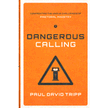Counselors Reflect on Dangerous Calling by Paul Tripp
A Series to Care for the Care Takers of God’s People
“You see, it is quite possible and, sadly, quite regular for us to use the Bible unbiblically. Even given its God-driven purposefulness, you can approach, handle, and make use of the Word of God in ways that are outside of its intended purpose.” (p. 50)
Whenever we use something in ways that it is unintended, sometimes it can be comical and cute. For example when I see my nephew use a spoon or a set of car keys as a toy soldier or musical instrument, the adults in the room all think it’s cute and he’s creative. Whenever we use something in ways it is unintended sometimes it can be beneficial and helpful. It reminds me of the old show MacGuyver where the actor Richard Dean Anderson would take ordinary things and use them for extraordinary purposes. He had the ability to take a rubber band, paperclip, pencil and rubbing alcohol to create a small gadget to help him get out of a life-threatening situation. And sometimes when we use things for reasons unintended it can be very dangerous and hurtful. When we take something that was made to heal and use it to maim. When prescription medication used to cure is instead overdosed on in order to kill. When a social media tool that was intended to connect people in a positive way is used as a medium to slander, gossip and do criticize. We can come up with a list a mile long to add to this.
The Bible also speaks about the inappropriate use of God’s word. In fact, God takes very seriously the proper use of his word. He will say “Do not add to my Word and don’t take away from it.” Jesus would rebuke the Pharisees and the religious opponents for taken God’s word and use it to judge unjustly, oppress and disobey God’s commands. In other sections of Scripture God would say through the prophet Isaiah, “Woe to those who call evil good and good evil, who put darkness for light and light for darkness, who put bitter for sweet and sweet for bitter!” (Isa. 5:20) Truthfully we all have misused and abused something whether intentionally or unintentionally. And as believers this would even include the misuse and abuse of Scripture.
If you are a pastor or leader in your church the temptation to do this is great. If you believe that you have to have the correct theological answer for every one of your member’s questions so as not to seem incompetent you might take a verse out of context. If you have difficulty learning from others you may be tempted to add to God’s word. If you aren’t humble enough to say “I don’t know” when God’s higher ways seem to confuse and escape you then you may be tempted to reinterpret God’s word. You see rightly handling God’s word is not just about having the right hermeneutical interpretation although that is important. It is the heart, motive, and intentions of the person wielding His word that matters most. This is why worship is the end of our all of study around the things of God. If we fail to worship and be captivated by God’s love we will inevitably use His word for selfish gain, to bring other to us and not to Him. When we are worshipping our identities in Christ are being reinforced. When we are not worshipping God everything becomes a tool to be used for self-worship and independence. When a pastor fails to worship he will be afraid to address certain subjects in the Bible. When he comes across topics that are hard to talk about and are cause for criticism he will avoid them because he not only has found his worth in what others think but also because his relationship with Christ lacks the kind of intimacy that will provide confidence and security in the midst of sensitive and difficult to interpret areas of Scripture.
Jesus brother James says that not everyone should be teachers of God’s word because they are to be judged more strictly. People’s lives are stake and their souls are given to the care of their pastors. No pastor or elder wants to stand before God and say “I preached and taught and did mighty works in your name” only to hear Jesus reply “Depart from me I never knew you.” Jesus reminds us and beckons us to know him, to be intimate with him, to worship him so that we may enter into his joy. So ask yourself “What kind of heart am I using to handle God’s word?”
 |
Dangerous Calling: Confronting the Unique Challenges of Pastoral Ministry By Paul David Tripp / Crossway Books & Bibles |
